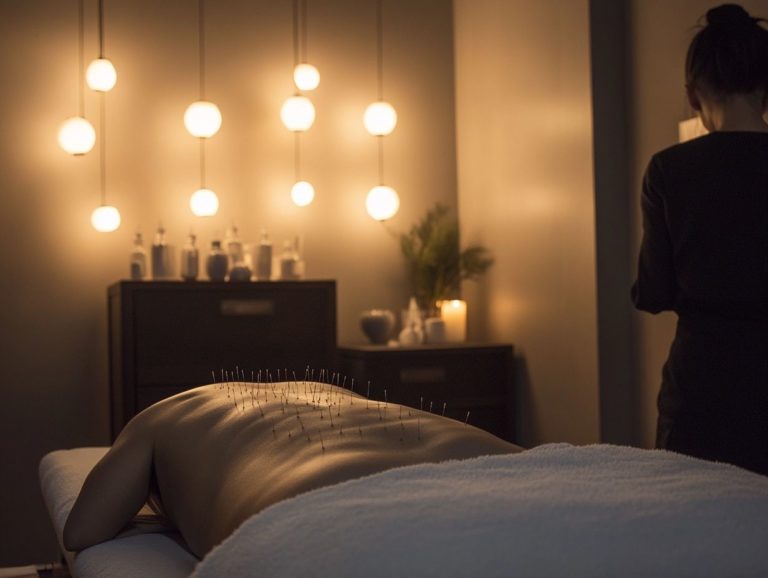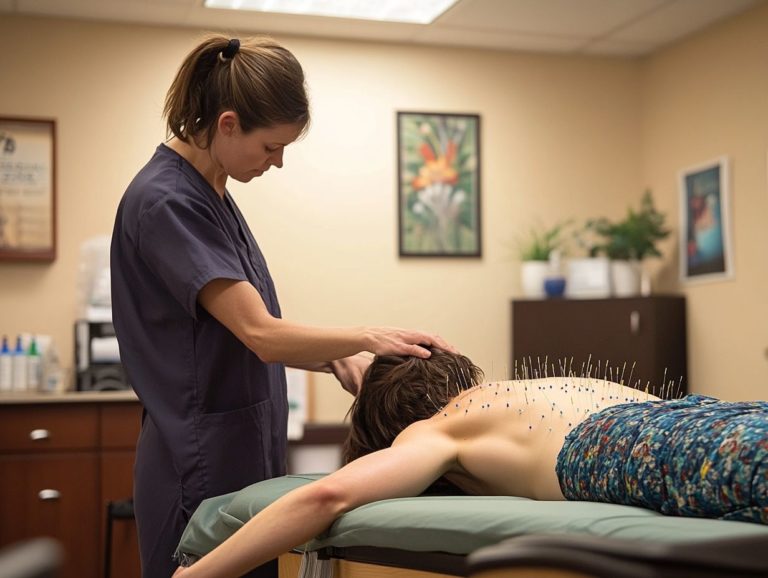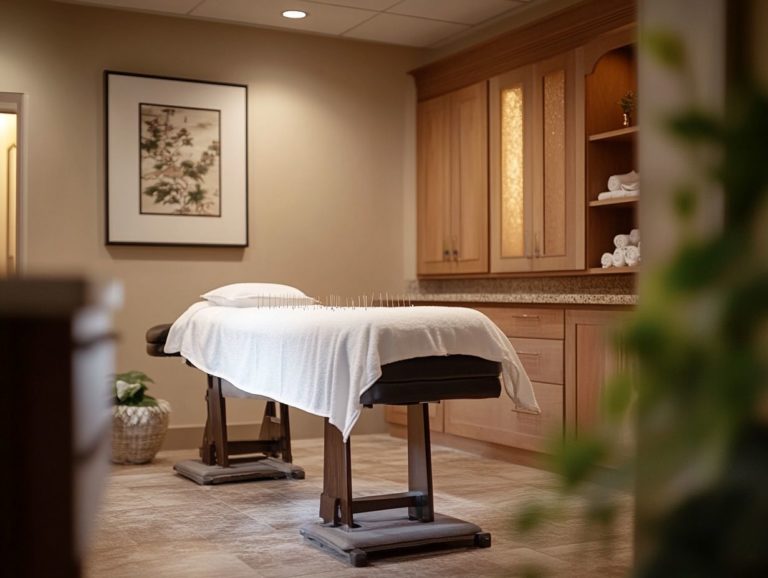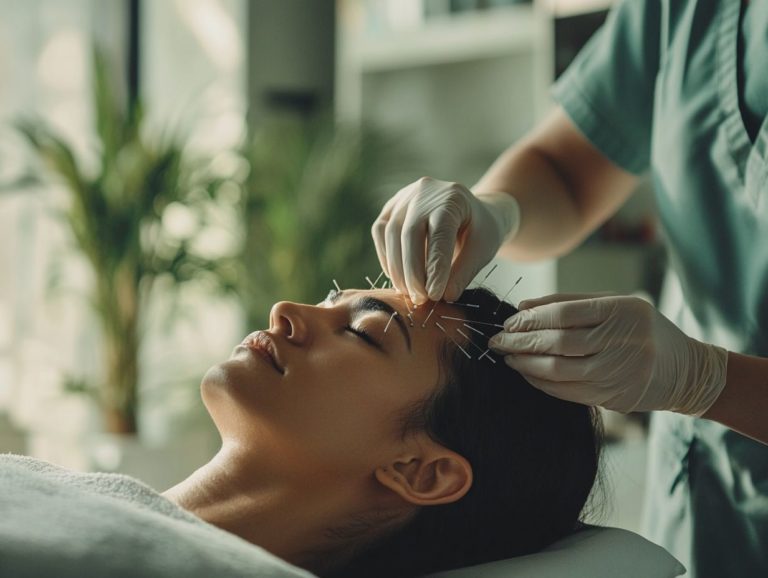5 Things to Consider Before Your First Acupuncture Visit
Considering acupuncture but feeling a touch uncertain about what lies ahead? This article reveals five must-know aspects to contemplate before your inaugural visit, guiding you through the nuances of this time-honored healing practice.
You ll gain insights into the fundamentals of acupuncture and discover how to select the right practitioner to enhance your experience. We ll also tackle common misconceptions and shed light on how acupuncture can bolster your overall health.
Immerse yourself in this knowledge to prepare for a truly rewarding experience!
Contents
- Key Takeaways:
- 1. Understand the Basics of Acupuncture
- 2. Research the Practitioner
- 3. Know Your Medical History
- 4. Discuss Your Expectations and Goals
- 5. Be Prepared for the Process
- What Is Acupuncture and How Does It Work?
- What Are the Different Types of Acupuncture?
- How Can Acupuncture Help with Specific Health Conditions?
- What Are the Possible Side Effects of Acupuncture?
- What Are the Qualifications and Certifications to Look for in an Acupuncturist?
- What Should You Ask Your Acupuncturist Before Your First Visit?
- How Can You Prepare for Your Acupuncture Session?
- What Can You Expect During and After Your Acupuncture Treatment?
- How Can You Continue to Benefit from Acupuncture After Your First Visit?
- What Are the Common Misconceptions About Acupuncture?
- Frequently Asked Questions
Key Takeaways:
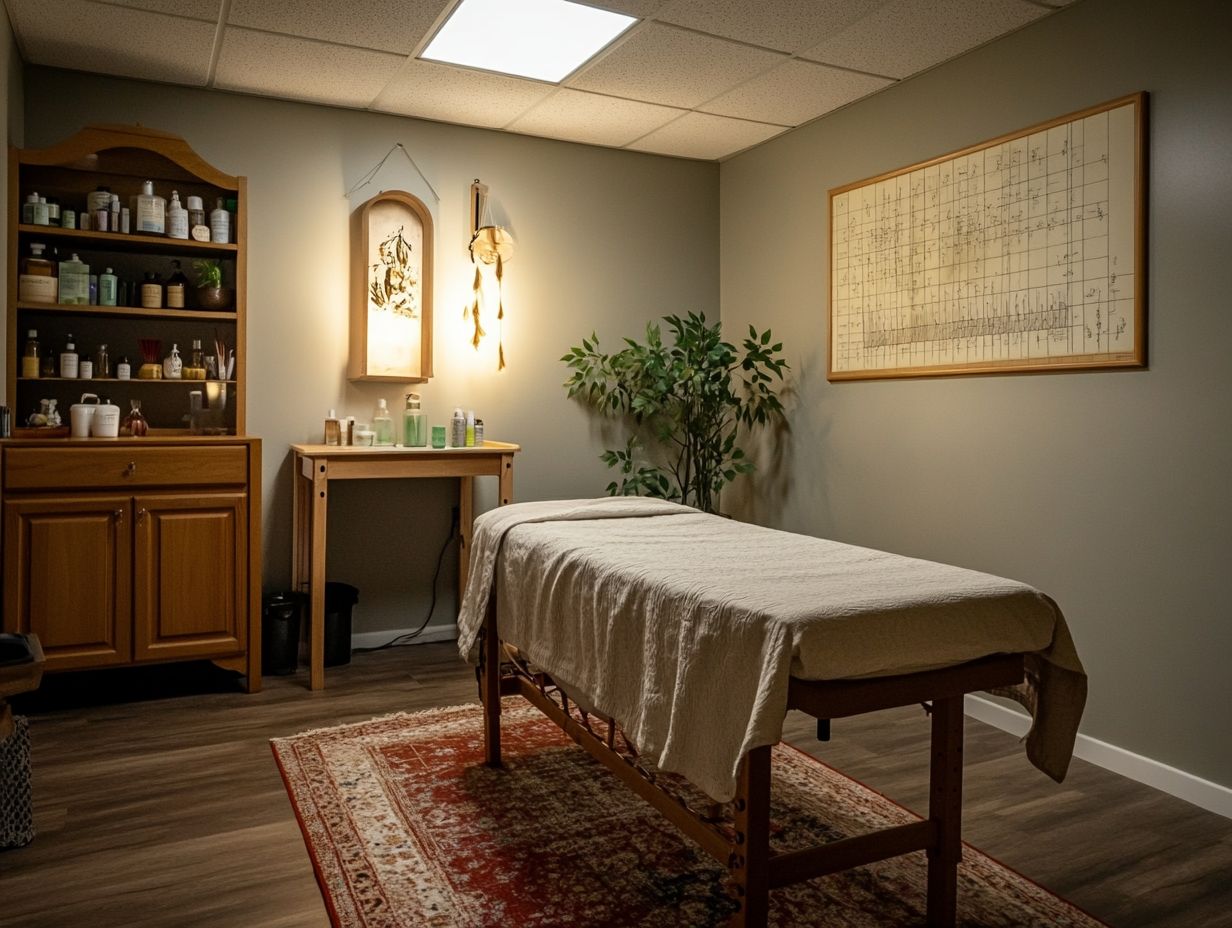
Understand the fundamentals of acupuncture, including how it works, different types, and potential benefits for your health.
Research and select a qualified and certified acupuncturist.
Communicate your medical history, expectations, and goals with your acupuncturist before your first visit.
1. Understand the Basics of Acupuncture
Acupuncture is an effective method rooted in traditional Chinese medicine that involves the careful insertion of fine needles into specific areas on your body. This process stimulates the flow of energy, enhances your overall care, and addresses a variety of health concerns, including chronic pain and anxiety relief.
This ancient practice has a rich history that spans thousands of years, grounded in the belief that a balanced flow of ‘Qi,’ or life energy, is vital for your overall wellness. Practitioners can help alleviate a range of ailments, from migraines to digestive disturbances by focusing on specific areas.
Beyond the physical aspect of needling, diagnostic tools like pulse diagnosis and tongue observation play a pivotal role in shaping personalized treatment plans. These tools offer valuable insights into your internal state and allow for a more tailored and effective approach to your care.
As you explore acupuncture, you may discover many wellness benefits, including enhanced relaxation, improved sleep quality, and a newfound sense of emotional balance.
2. Research the Practitioner
Researching the qualifications and certifications of an acupuncture practitioner is essential for ensuring effective patient care and safety throughout your treatment journey.
Look for practitioners who are licensed and certified by recognized acupuncture boards. This not only affirms their adherence to professional standards but also reflects their dedication to delivering high-quality care.
Experience with techniques like cupping and moxibustion is crucial in a practitioner s ability to tailor treatments to your specific health concerns. These specialized methods can significantly enhance the overall effectiveness of acupuncture, addressing issues like pain management or stress relief more comprehensively.
A well-qualified acupuncturist offers invaluable expertise that translates directly into improved outcomes for you as a patient.
3. Know Your Medical History
Understanding your medical history is vital in preparing for acupuncture treatment. It enables the practitioner to create a personalized treatment plan that directly addresses your unique health concerns.
By providing detailed information about past treatments and current conditions, you ensure that the acupuncturist gains a comprehensive understanding of your overall health. This depth of information enhances the effectiveness of the chosen techniques and fosters a safer environment during your treatment.
When you share your medical background chronic conditions, medications, and prior experiences with alternative therapies you enable the practitioner to make informed decisions. This level of transparency ultimately enhances your treatment outcomes and sets the stage for a more effective healing journey.
4. Discuss Your Expectations and Goals
It s essential to openly discuss your expectations and goals with your acupuncturist. This ensures that your acupuncture treatment aligns perfectly with your aspirations for anxiety relief, pain management, or any other specific health concerns.
By clearly communicating these desires, your acupuncturist can customize the sessions to effectively target your individual needs. This collaborative approach nurtures a more supportive therapeutic relationship and significantly increases the likelihood of achieving the outcomes you seek.
Incorporating relaxation techniques into your overall treatment plan is crucial for promoting your well-being. When strategies like deep breathing, guided imagery, or mindfulness are harmonized with acupuncture, they enhance the benefits, helping you feel more at ease as you navigate your healing journey.
5. Be Prepared for the Process
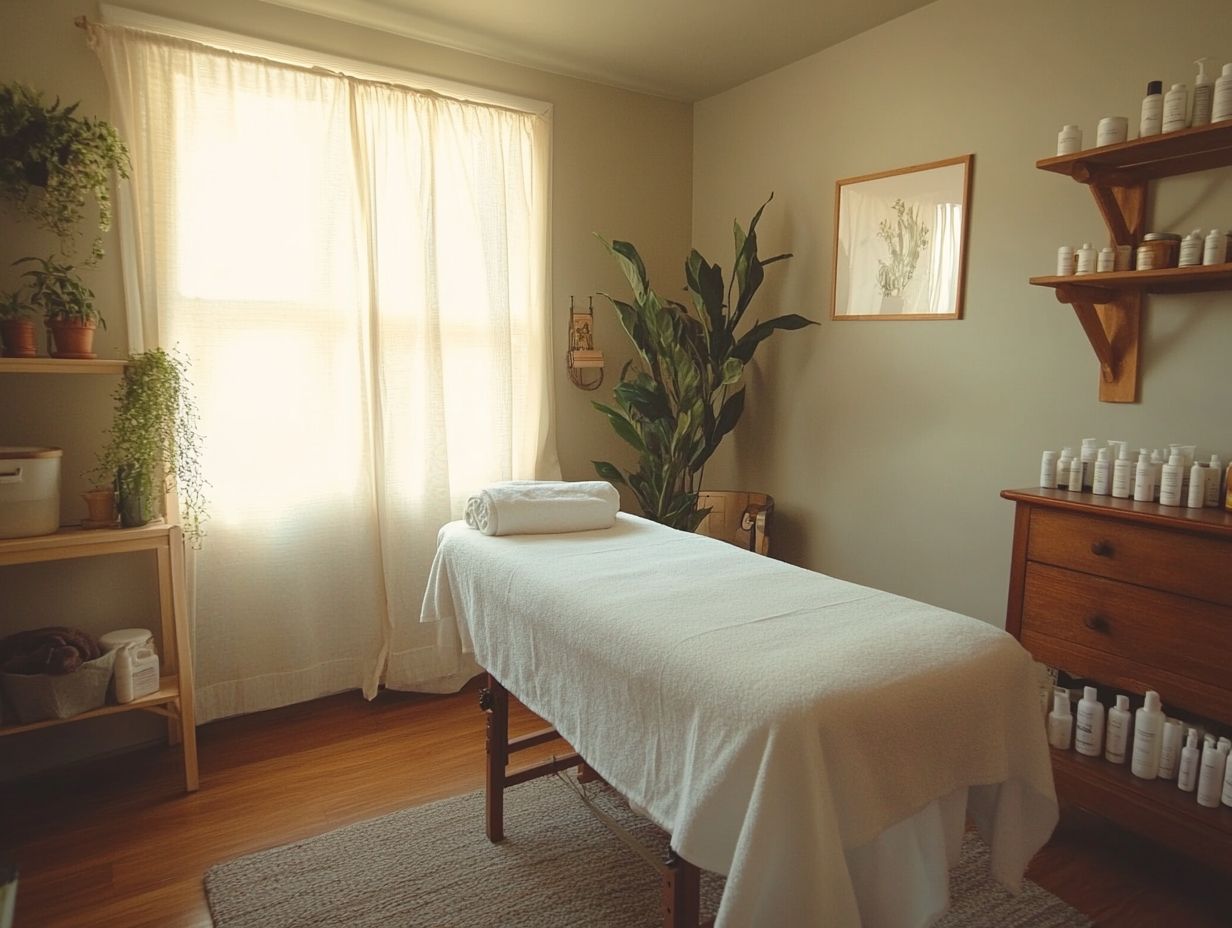
Get ready for an amazing acupuncture experience! Being well-prepared can greatly enhance your journey. Choose loose clothing to enhance your comfort and address any needle phobia you may have.
During your session, notice that the environment is intentionally designed to foster relaxation, often featuring dim lighting and soothing music. Acupuncturists typically use thin needles, inserted with precision to create minimal discomfort.
It s advantageous to communicate openly about any anxieties beforehand. This allows the practitioner to tailor the session to your needs. To cultivate a calming atmosphere, deep breathing exercises or visualization techniques can be very helpful before you begin.
Keep in mind that the focus is not solely on alleviating physical ailments; it s about nurturing an overall sense of well-being. Don t miss the chance to experience powerful healing and tranquility through acupuncture!
What Is Acupuncture and How Does It Work?
Acupuncture is a pivotal element of traditional Chinese medicine. It stimulates specific points on your body, restoring energy flow and promoting a natural healing process that enhances your overall wellness.
This ancient practice rests on the belief that your body is governed by vital energy, known as qi, which flows through pathways called meridians. When there’s an imbalance or blockage in this energy flow, it can lead to various health issues, impacting not just your physical state but also your emotional and mental well-being.
Practitioners focus on these specific acupoints to realign and invigorate your body’s energy, encouraging self-healing and harmony. This holistic approach makes acupuncture a versatile treatment option, offering relief from chronic pain, anxiety, stress, and a host of other concerns by tackling the underlying causes rather than simply addressing the symptoms.
What Are the Different Types of Acupuncture?
You ll find a variety of acupuncture techniques at your disposal, including dry needling, cupping, and moxibustion. Each offers its own unique benefits within the realm of traditional Chinese medicine.
These methods cater to a wide spectrum of health concerns, ranging from pain relief to digestive issues.
- For example, dry needling targets muscle knots and tension, making it particularly effective for athletes or anyone grappling with chronic pain.
- In contrast, cupping enhances blood circulation and aids recovery after workouts, while moxibustion uses heat to stimulate specific points, often targeting respiratory concerns.
When you combine these techniques, you can craft a holistic treatment plan that not only alleviates immediate symptoms but also nurtures your overall well-being.
How Can Acupuncture Help with Specific Health Conditions?
Acupuncture is effective for various health conditions, including chronic pain, anxiety, allergies, and digestive issues. This versatile treatment option can be beneficial for you.
This ancient practice involves inserting fine needles into precise points on your body to stimulate healing and promote balance. Many people use acupuncture not just for pain management but also to enhance mental wellness and boost immune responses.
For example, a patient suffering from debilitating migraines may find significant relief after several sessions. Similarly, someone grappling with anxiety might experience newfound calm, allowing her to handle daily challenges more easily.
These experiences illustrate acupuncture’s holistic approach, enabling treatment to be tailored to your unique needs and fostering a deeper understanding of your overall health.
What Are the Possible Side Effects of Acupuncture?
While acupuncture is generally safe, be aware of potential side effects, such as temporary soreness or bruising at the needle sites. Discuss these with your practitioner as part of your overall care.
You may experience mild fatigue or a temporary increase in symptoms, which can be part of your body’s adjustment process. It’s essential to monitor how you feel during treatment and communicate any discomfort you encounter.
This open dialogue strengthens the relationship between you and your practitioner, allowing for adjustments in technique or needle depth to enhance your healing experience. Addressing side effects promptly helps ensure a customized approach that aligns with your healing journey.
What Are the Qualifications and Certifications to Look for in an Acupuncturist?
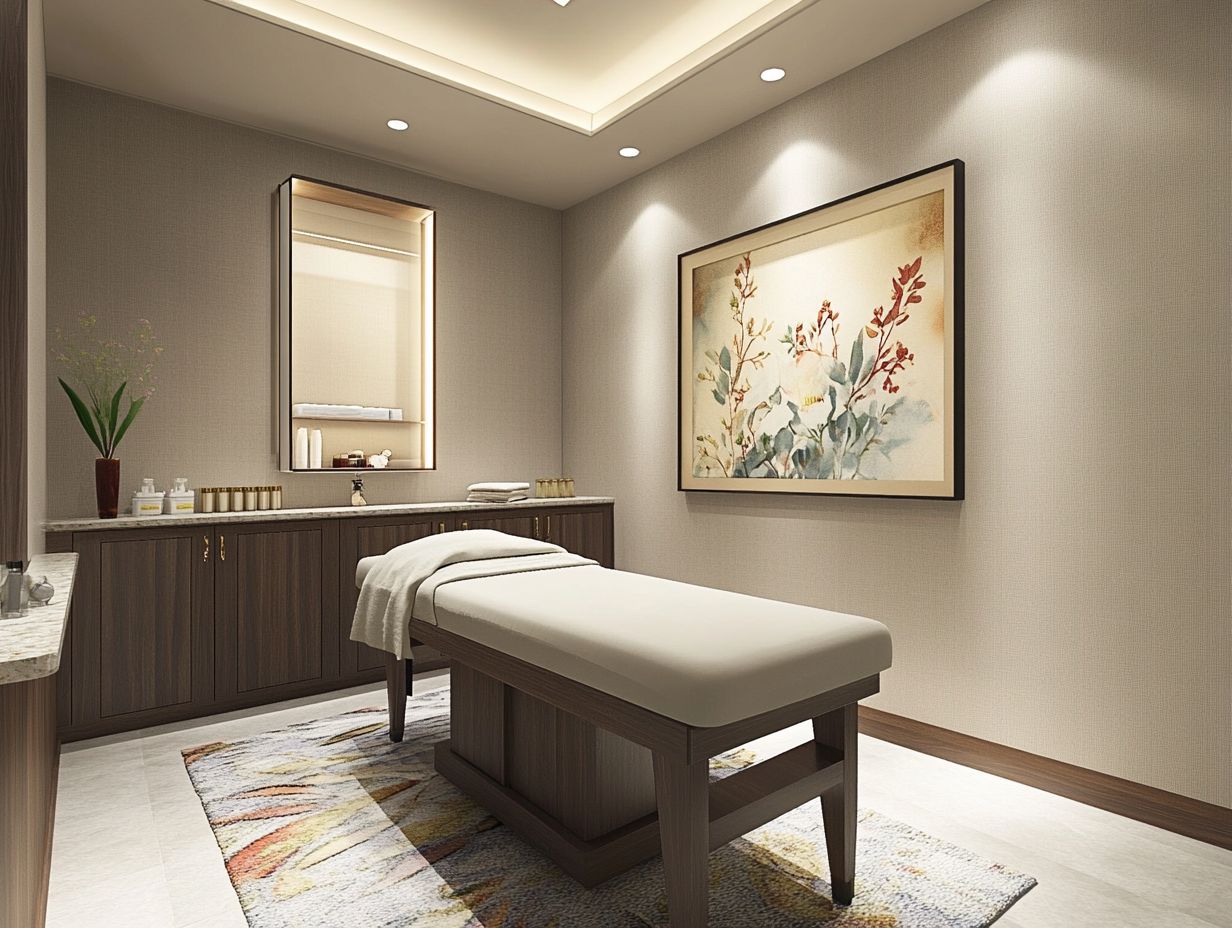
When searching for an acupuncturist, verify their qualifications and certifications to ensure safe and effective care. Check their educational background and confirm they have the necessary state licenses to practice.
Many reputable practitioners have completed an accredited degree in traditional Chinese medicine or acupuncture, providing a solid foundation for their expertise. Don’t hesitate to ask about any specialized training, such as moxibustion (a technique using mugwort) or cupping (a suction therapy), as these can enhance treatment effectiveness.
Feel free to request references or testimonials; this will give you a clearer picture of their track record in delivering successful outcomes for previous patients.
What Should You Ask Your Acupuncturist Before Your First Visit?
Before your first visit, don’t miss the chance to ask your acupuncturist key questions that will help you understand their approach and the proposed treatment plan. For more details, check out this guide on how to prepare for your first acupuncture visit. This ensures your experience is comfortable and effective.
Consider inquiring about their educational background and years of practice. What specific treatment techniques do they use, and how do these align with your health concerns?
It’s also valuable to ask how they assess a patient’s needs and how adaptable they are in modifying treatments based on individual responses. Sharing any prior experiences with acupuncture sets the stage for a more personalized interaction.
This open dialogue not only reassures you but also builds a foundation of trust, significantly enhancing your healing journey.
How Can You Prepare for Your Acupuncture Session?
Proper preparation for your acupuncture session can enhance its effectiveness. Wear loose, comfortable clothing and practice relaxation techniques to ease any anxiety.
In addition to dressing comfortably, arrive at the clinic with an open mind and calm demeanor. Creating a calm space before your session begins paves the way for a fruitful experience.
Engage in deep-breathing exercises or gentle stretches to center your thoughts and minimize pre-treatment jitters. A peaceful atmosphere, free from distractions, helps you achieve a relaxed state and allows the practitioner to work more effectively.
Remember, the objective is to embrace the healing process fully and let it unfold naturally.
What Can You Expect During and After Your Acupuncture Treatment?
Understanding what to expect during and after your acupuncture treatment can significantly reduce anxiety and enhance your overall healing process, ensuring a truly positive experience.
Typically, each session lasts between 30 to 60 minutes. You may feel a range of sensations as the needles are gently inserted. Some individuals describe experiencing a slight tingling or warmth, while others may find themselves enveloped in a profound sense of relaxation.
Be sure to communicate any discomfort during the procedure, as practitioners are trained to adjust the treatment to suit your needs.
After your session, you might feel a blend of rejuvenation and fatigue. Staying hydrated and avoiding strenuous activities for the rest of the day can facilitate your recovery.
Common side effects might include minor bruising or fatigue, but don t worry these are typically temporary and resolve quite quickly.
How Can You Continue to Benefit from Acupuncture After Your First Visit?
To truly unlock the wellness benefits of acupuncture, it s essential to understand how to continue your care after that initial visit. Integrating lifestyle changes and follow-up treatments into your routine is key.
Follow-up appointments are vital, not just for tracking your progress but also for fine-tuning your treatment plan as necessary. Maintaining open communication with your acupuncturist allows you to address any concerns, making sure your treatment fits your changing needs.
Embracing healthy habits like proper nutrition, regular exercise, and mindfulness practices can significantly amplify the effects of acupuncture, paving a holistic path to overall wellness. By dedicating yourself to this comprehensive strategy, you can enjoy sustained improvements in your health and well-being!
What Are the Common Misconceptions About Acupuncture?
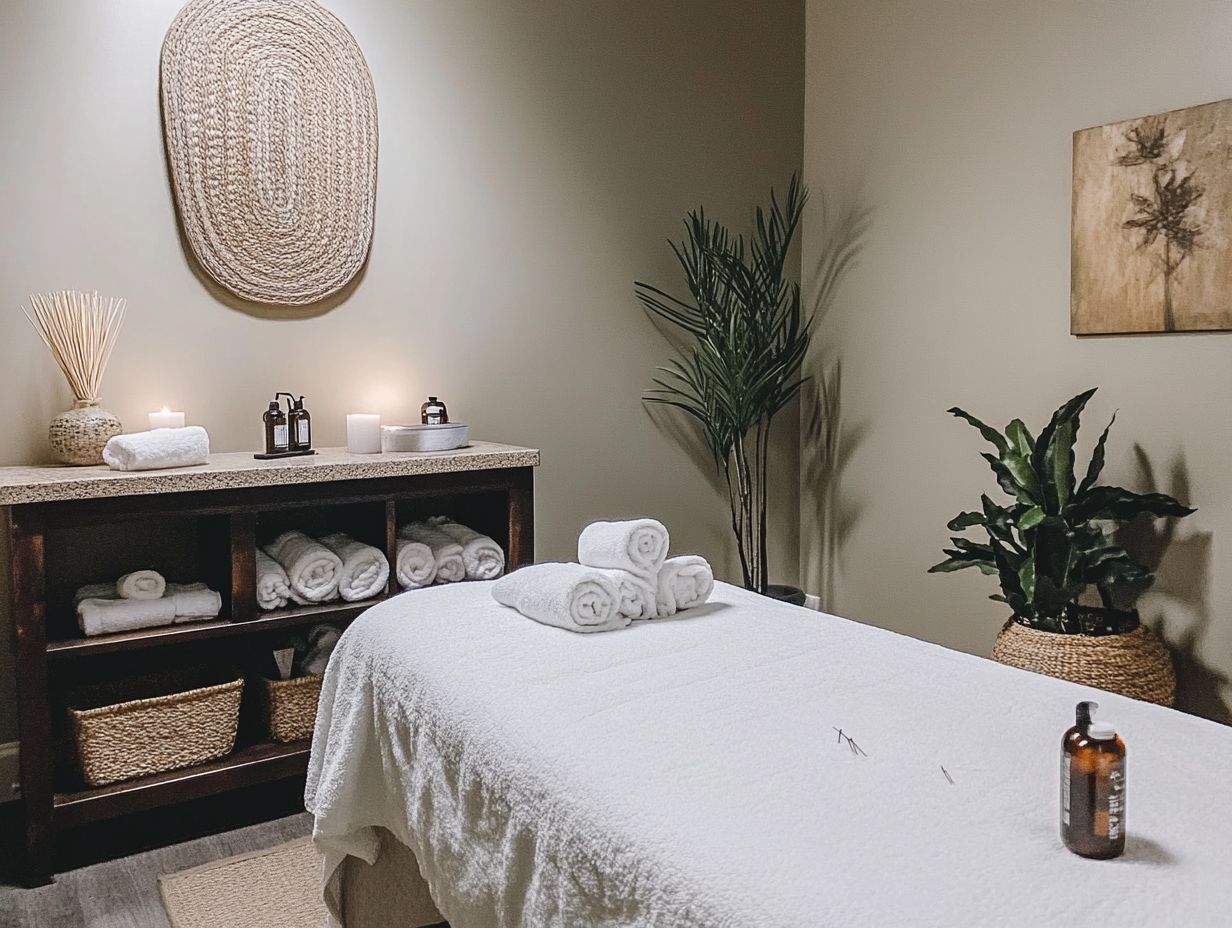
There are several common misconceptions surrounding acupuncture, including fears rooted in needle phobia and misunderstandings about its effectiveness within traditional Chinese medicine. These concerns may inadvertently deter you from exploring this holistic approach to health.
For instance, many people assume that acupuncture is solely for pain relief, overlooking its broader applications, such as stress reduction and improved digestion.
Education shifts these perceptions. By providing clear, evidence-based information, you can cultivate confidence in this therapy.
Learning about acupuncture’s principles and the research supporting its efficacy can help demystify the practice and encourage those who are hesitant to give it a try. By addressing these myths openly, you foster trust and promote a more informed perspective on this valuable treatment.
Frequently Asked Questions
What is acupuncture?
Acupuncture is a form of traditional Chinese medicine that involves inserting thin needles into specific points on the body to stimulate energy flow and promote healing. This is believed to balance the body’s energy, known as qi (pronounced ‘chee’), to improve overall health and well-being.
What are the benefits of acupuncture?
Acupuncture has been shown to be effective in treating various conditions, such as chronic pain, migraines, anxiety, and fertility issues. It can also help improve overall physical and mental wellness by promoting relaxation and reducing stress.
What should I look for in an acupuncturist?
Before your first acupuncture visit, research and choose an acupuncturist who is licensed and experienced. They should have a clean and sanitary office and be willing to answer any questions or concerns you may have.
Is acupuncture a painful procedure?
Most people do not experience pain during acupuncture. The needles used are very thin and often described as feeling like a slight prick or tingling sensation. Any discomfort or pain should be minimal and temporary.
What should I expect during my first acupuncture visit?
During your first visit, the practitioner will discuss your medical history and the reasons for seeking treatment. They will then insert needles into specific points on your body, which may be left in place for several minutes. You may also receive additional treatments, such as cupping or herbal therapy.
Are there any side effects from acupuncture?
Most people don’t have negative side effects from acupuncture. Some may notice slight bruising or soreness where the needles go in.
Acupuncture is a traditional Chinese therapy that involves inserting thin needles into specific points on the body. Tell your acupuncturist about any medications or supplements you take. They may affect your treatment.

